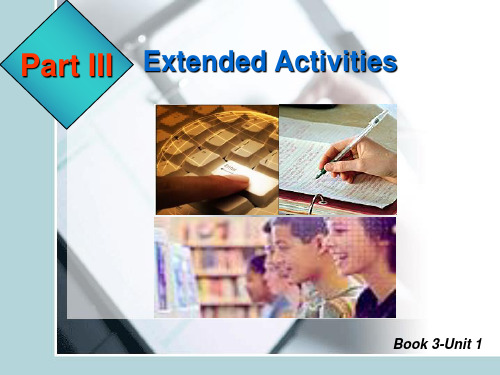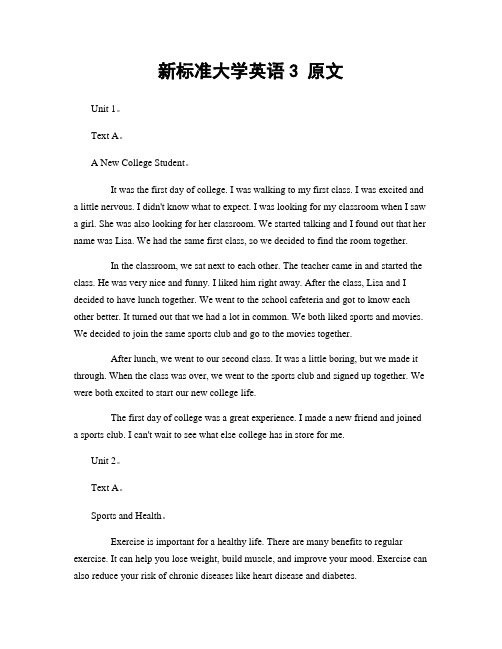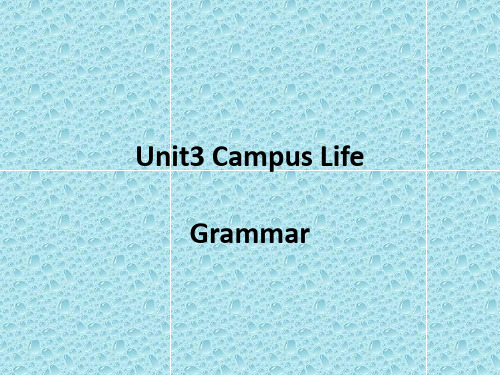基础英语3 uint6-03
中职《英语3(基础模块)》PPT多媒体课件Unit 6

in the July 20 issue of Southern Weekly. I am 22 years old, outgoing and cooperative. I graduated from Guangzhou Technical
Institute of Tourism & Commerce in 2006, majoring in Business English.
Human Resources Department National Starch & Chemical (Guangdong) Ltd. No. 5 Huijing Road, Liwan District Guangzhou 510000
中专英语3(基础模块).uni

04
Unit 4
Unit 5
05
Job Interview Skills Business Correspondence Office Communication Product Promotion Teamwork and Leadership
Teaching Method
Lecture Method
The teacher will deliver presentations on key concepts and theories related to the course content.
Case Study Method
Role-play Activities
Group Discussions
学习反馈
学习奖励
对于表现优秀的学生,教师可以给予 一定的奖励和鼓励,激发学生的学习 积极性。
教师需要及时给予学生反馈,指导学 生改进学习方法,提高学习效果。
04
Textbooks and Resources
Textbook selection and use
选择合适的教材
选择内容贴近实际工作场景、语言难度适中、配备丰富练习材料的教材。
Cross-cultural Understanding
To promote understanding and respect for different cultures in the global workplace.
பைடு நூலகம்
Course Outline
01
Unit 1
02
Unit 2
03 Unit 3
Critical Thinking
To cultivate students' analytical and critical thinking skills in English through discussions and case studies.
基础英语3 uint6-01

Educational Functions
教育职能部门 nursery, kindergarten, play center, day-care center, kindie (informal, colloquial expression) elementary schools (AmE),primary schools (BrE) junior high School/senior high school (AmE), middle school/high school (Chinese), comprehensive school (BrE), grammar school/public school (mainly BrE) college, university, academy (mainly AmE, a secondary or high school, esp. a private one; a school or college for special instruction or training, such as a military academy) school (for professionals), vocational school/institute, institute (for education or research) boarding school
Book 3-Unit 6
Educational System
group, class, grade (form in British elementary and
secondary education) pre-school education, elementary (or primary)/ secondary/tertiary education basic education, compulsory education, higher education, adult education examination-oriented education, quality-oriented/ competence oriented education universal education, vocational education, school curriculum reform, education reform school management system, commercialization of educational functions 教育、学校产业化
基础英语3 uint1-03

General impression of each other
During Amy’s childhood Work Education Interests Marriage Children Conclusion: Do they love each other? Comment on their relationships. Book 3-Unit 1
Book 3-Unit 1
Raise questions about the underlined parts.
1. I see her as my best friend. 2. She’d always come to me first if she had a problem. 3. We have the same sense of humour, and share interests. 4. I don’t mind animals, but she’s completely obsessed with them. 5. We were closest when she was about four.
Book 3-Unit 1
Read the story and do the True / False / Not mentioned exercise. T F T F T
1. James would rather have had a son than a daughter. 2. A child’s most lovely when it is under four. 3. When Amy was a teenager, she had a lot of boyfriends. 4. James liked the way Amy made friends with boys.
新标准大学英语3 原文

新标准大学英语3 原文Unit 1。
Text A。
A New College Student。
It was the first day of college. I was walking to my first class. I was excited and a little nervous. I didn't know what to expect. I was looking for my classroom when I saw a girl. She was also looking for her classroom. We started talking and I found out that her name was Lisa. We had the same first class, so we decided to find the room together.In the classroom, we sat next to each other. The teacher came in and started the class. He was very nice and funny. I liked him right away. After the class, Lisa and I decided to have lunch together. We went to the school cafeteria and got to know each other better. It turned out that we had a lot in common. We both liked sports and movies. We decided to join the same sports club and go to the movies together.After lunch, we went to our second class. It was a little boring, but we made it through. When the class was over, we went to the sports club and signed up together. We were both excited to start our new college life.The first day of college was a great experience. I made a new friend and joined a sports club. I can't wait to see what else college has in store for me.Unit 2。
中职英语基础模块上册第三单元课文ppt课件

变复数时在词尾加-s.如:Americans,Asians,Russians, Australians,Italians,Germans等。
•
注意:Englishman Englishmen,Frenchman Frenchmen.
.
• 3. 复合名词的复数形式:
•
(1)在词末加-(e)s,如:afternoons,
.
• (一)可数名词的复数形式的构成规则
• 在英语中,可数名词如果表示的数量为“一 个”,则用其单数形式,若表示的数量为 “一个以上”,则
• 1. 一般情况下在名词的词尾加s,如:
• book--- books,pencil ---pencils.
• 2. 以-s,-x,-ch,-sh结尾的名词加-es,
•
一般可数,有单复数形式。
•
(3)物质名词。如:rice,water,cotton等。
•
一般不可数,没有单复数之分。
•
(4)抽象名词。如:love,work,life等。
•
一般不可数,没有单复数之分。
•
2. 专有名词:如:China,Newton,London等。
.
• 名词可数名词和不可数名词 • 不可数名词一般没有复数形式, • 如:water---some water , milk---a glass of milk • 可数名词有单数和复数两种形式。 •
and, but • 感叹词(interj.):表示说话时的喜悦、惊讶等情感,
oh, well
.
• 一、名词的分类
•
名词可分为普通名词和专有名词两大类。
•
1. 普通名词又可分为:
•
(1)个体名词。如:cup,desk,student等。
三年级英语上册-Uint-6-第六单元-教案-人教PEP
Unit 6 Happy birthday!The First Period教学目标1.能听、说、认读数字1~5的英文表达。
2.能听懂有节奏、有韵律的歌谣并能根据歌谣中的指示语做动作。
教学重、难点分析重点:能认读数字1~5的英文表达并能按歌谣中的指令做出相应的动作。
难点:能在实际情景中灵活运用所学知识。
教学准备1.准备教学挂图和录音。
2.准备铅笔和扑克牌。
3.学生准备纸张。
教学过程一、课前热身(Warm-up)1.打招呼。
2.教师播放歌曲Happy birthday的录音,师生共同演唱,师生边唱边拍手。
二、课前预习(Preview)1.教师准备好一幅含有数字的图片,然后贴在黑板上让学生在图片中找出数字。
2.学生每人准备五根铅笔,教师随意说数字,学生举起相应根数的铅笔。
三、新课呈现(Presentation)1. A. Let’s learn.(1)教师拿出一支铅笔,说:“I have one pencil.”,再拿出一支铅笔,说:“I have two pencils.”,依次类推,直到拿出五支铅笔。
(2)教师在黑板上的四线三格内写上数字1~5的英文表达,并在单词上面画出相应数量的铅笔数。
然后教师带读几遍单词。
(3)教师用句型“Show me...”说指令,学生出示相应数量的物品。
(4)听音播数。
规则:每位学生准备一张纸,教师说数字,学生听音并写相应的数字。
2. A. Let’s chant.(1)教师出示学生在操场上跳绳的图片,并演示“跳”的动作,帮助学生理解“jump”的意思。
然后让全班学生一起做“jump”的动作。
(2)播放两遍本部分的教学录音,师生一起听。
(3)再次播放录音,全班学生跟录音唱。
(4)全班学生分组、分男女生比赛唱歌曲。
(5)游戏:教师说数字1~5,学生听到单数就坐着不动,听到双数就做“jump”的动作。
四、巩固延伸(Consolidation & Extension)1.游戏:What’s missing?教师将写有数字1~5的扑克牌放在一个纸袋中,让学生闭眼,教师快速藏起其中的一张,让学生猜少了哪一张,猜对的学生上讲台继续抽扑克牌,依次类推。
高教版(2021)基础模块3 Unit 1 Festivals Around the... 课件
18. mean v. ①意味着 mean doing sth. 意味着做某事 eg: Success means working hard. 成功意味着工 作努力。 ②意思是 eg: What do you mean?你的意思是什么? ③打算 mean to do sth.打算做某事 eg: We mean to call on you tomorrow. 我们打算 明天看望你
perform v. 表演 performer n. 表演者
eg: The performers perform well. 表演者们表演的很出色。
17. traditional adj. 传统的 traditional culture传统文化 traditional Chinese painting中国画
11. gala n. 庆典,盛会 Spring Festival Gala春节联欢晚会
gala adj. 欢乐的 eg: The National Day is a gala day. 国庆节是工艺 art and craft 工艺品 craft paper牛皮纸
reunion /riːˈjuːnjən/ n. 团圆
performance /pəˈfɔːməns/ n. 表演
lunar /ˈluːnə/ adj. 农历的
traditional /trəˈdɪʃən(ə)l/ adj. 传统的
bright /braɪt/ adj. 明亮的
mean /miːn/ v. 意味着
英语基础模块3unit6教学设计
—What role can smiling play in our daily life?
—Smiling plays an important role in our daily life.
学生重复两三遍此问答。接着,教师教学生说:Smiling can help us and everyone around us live a longer, healthier and happier life.除以上答案外,鼓励学生畅所欲言,教师给予适当的帮助和补充。
2.任务型教学法
3.竞争激励学习法
4.自主学习法
教学
手段
多媒体课件、PPT、Mp3音频、动画微课等
教学过程
教学内容
活动分析
教学设计问题进行热身开头的活动,不如说本活动的目的
是将学生带动起来把微笑传递给他人。建议教师以拍一张集体微笑照的活动开始,再带入同学们对这三个问题的讨论,则将大大地调动学生参与本单元学习的积极性。
4.让学生了解不同国家对微笑的认知,更好地理解中外文化非语言交流的差异;
5.多安排学生进行两人问答,培养学生积极参与学习的意识及合作学习、探究学习的好习惯。
教学
重点
重点词汇和短语
comfort, pleasant, cheerful, under pressure, give me five, pass on, blood pressure
活动2
本部分是讨论匹配题,旨在引导学生感受教材图片展示的男女老少不同人物、不同场合的微笑,感受微笑带给我们生活的美好。通过小组讨论,掌握不同类型微笑的英文表达。
1.教师先让学生朗读图片中的四个短语,遇到不会的词先跳过,继续往下读,教师做到心中有数。
2021年人教PEP版英语六年级下册 Uint3基础卷(二).doc
2021年人教PEP版英语六年级下册 Uint3基础卷(二)姓名:_____________ 年级:____________ 学号:______________题型选择题填空题解答题判断题计算题附加题总分得分一、单项选择题。
(每小题3分,共30分)()1.Where did you________last night?A. goB. doC. went()2.-________did Linda go to school?-By bike.A. WhatB. HowC. Where()3.Nancy and Lucy________a lot of fun yesterday.A. haveB. hadlA. happened;fell off;hurtB. happens;falls off;hurtC. happened;fall off;hurt()10.I can’t eat them.They________be ready________June.A. won’t;onB. will;tillC. won’t;till二、判断题。
(每小题2分,共10分)读短文,判断对(√)错(×)。
Hello,I’m Jin Bao.I went to Zhangjiajie with my family last National Day holiday. We went there by car. On the first day, we went to the nature park. On the second day, we went to Tianmen Mountain. We climbed the mountain. We were so excited. On the third day, we went to Ancient Town of Fenghuang(凤凰古城). It is a beautiful place. We bought some presents. Of course, we took many nice pictures. I saw many old buildings there. I had a good time on my holiday.()1.We drove to Zhangjiajie.评卷人得分()2.I climbed a mountain on October 1st.()3.I was excited to climbing the mountain.()4.We bought some gifts in Ancient Town of Fenghuang.()5.We took many photos there.三、填空题。
- 1、下载文档前请自行甄别文档内容的完整性,平台不提供额外的编辑、内容补充、找答案等附加服务。
- 2、"仅部分预览"的文档,不可在线预览部分如存在完整性等问题,可反馈申请退款(可完整预览的文档不适用该条件!)。
- 3、如文档侵犯您的权益,请联系客服反馈,我们会尽快为您处理(人工客服工作时间:9:00-18:30)。
Book 3-Unit 6
Thank You Sincerely
Thanks for the start to the lives that we’ve had. Thanks for the nights that you went without rest. So many memories, most happy, some sad; If you weren’t perfect, you still passed the test, Holding our hands, holding back all the fears. Thank you sincerely for all of those years.
or educators, but this is not explicit in the poem.
Book 3-Unit 6
T
F
NM 4. The gardener in the poem represents a teachion
Read the poem “Thank You Sincerely” and discuss the questions in small groups.
Book 3-Unit 6
Although this may be the true reason why his wife left him, it was not mentioned in the poem.
NM 4. The schoolmaster’s wife left because he could
He looks out of the window at the trees for a long time, breaking his chalk slowly in one hand, forgetting the rules of long division. All these details show that the schoolmaster was absent-minded and couldn’t concentrate on the class. The poet hints that the schoolmaster behaved abnormally because his wife had left him.
“Auntie” here refers to the woman in the cloakroom, where the schoolmaster left his overcoat. She argued with him because he couldn’t find his ticket for the coat. It is a common practice for people to leave their coats in the cloakroom when they go into a building and they will be given a ticket with number so that they can collect their coats when they go out again.
Book 3-Unit 6
For the examples you set every day, Teaching with actions, those lessons hold tight. We hardly knew just how much you could say Simply by doing what you knew was right. Now that we’re older, the logic appears. Thank you sincerely for all of those years.
Book 3-Unit 6
So many hours that you worked to provide Multiplied by all the days that we grew, When we behaved and the times we defied, Never a doubt we could still count on you, Making our laughter and drying our tears. Thank you sincerely for all of those years. Thanks for the rules that we wished were not there. Thanks for the wisdom we sometimes denied. All the attention and all of the care, All the forgiveness and all of the pride, Pointing out faults but then calling out cheers. Thank you sincerely for all of those years.
Part III Extended Activities
Book 3-Unit 6
Extended Activities
Dictation Read More Grammar and Vocabulary Translation Raise Questions Writing Cultural Information
Book 3-Unit 6
True/False/Not Mentioned
(page 94) T
1. The gardener took care of the rose throughout its life. 2. The rose laughed at the gardener for his old age and predicted more than once that “he will soon die”. However, the old gardener outlived the rose. 3. The poet’s purpose was to praise the surprising beauty of the rose and the hard work of the gardener. who devoted all his/her life to the nurturing of beauty. It is an inference that the Gardener refers to teachers
Book 3-Unit 6
The Rose and the Gardener
Underline words and phrases you suspect may be particularly significant. Make notes in the margins. Ensure that you fully understand every word used in the poem: no word is there by chance! Say in your own words what theme you feel the poem is addressing, and decide which poetic elements and techniques, evident in the poem, are particularly responsible for conveying that theme.
Book 3-Unit 6
True/False/Not Mentioned
(page 93) T F F
1. This poem was written through the eyes of the pupils. 2. The schoolmaster made a mistake on the blackboard because he was getting old and his memory was poor. 3. The schoolmaster was indifferent to his wife’s leaving.
Return to Menu Book 3-Unit 6
In general, children in primitive societies are much loved, and when their childhood is not overshadowed by disease or famine, they grow up free and lively. Their education is based on an imitation of adult life, and on the teachings of their elders. Children learn about their own family and its place within a group of other families. Primitive children are a good deal freer in everyday life than are children in the “civilized” world. Their Script relations with others in their village are controlled less by rules and regulations than by their own knowledge of what is proper and improper that will be important to them throughout their lives.
